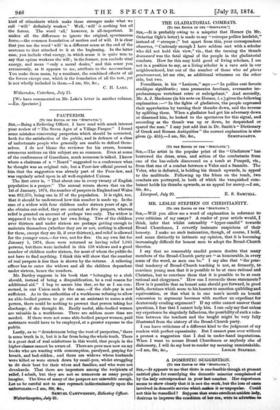PAUPERISM.
[TO THE EDITOR Of THE " SPECTATOR:1 Sun,—Being a Relieving Officer, I have read with much interest your review of " The Seven Ages of a Village Pauper." I found some mistakes concerning pauperism which should be corrected, both for the satisfaction of the public, and in defence of a class of unfortunate people who generally are unable to defend them- selves. I do not blame the reviewer for his errors, because erroneous notions on this subject are so common. Even at some of the conferences of Guardians, much nonsense is talked. I know where a chairman of a " Board " suggested to a conference what he thought was an original rule, but a Poor-law official proved to him that the suggestion was already part of the Poor-law, and was regularly acted upon in all well-regulated Unions.
The first error is, " That about one in every twenty of English population is a pauper." The annual return shows that on the 1st of January, 1874, the number of paupers in England and Wales was 832,370, being one in 27 of the population. It is right, too, that it should be understood how this number is made up. In the case of a widow with four children under sixteen years of age, if she obtains out-relief, they are counted as five paupers, whereas relief is granted on account of perhaps two only. The widow is supposed to be able to get her own living. Two of the children over thirteen and under sixteen are perhaps getting enough to maintain themselves (whether they are or not, nothing is allowed for them, except they are ill, if over thirteen), and relief is allowed for the younger ones,—for two, not for five. On my own list for January 1, 1874, there were returned as having relief 1,045 persons, but there were included in this 138 widows and a good number of children under sixteen, for most of whom the public do not have to find anything. I think this will show that the number of real paupers is less than is shown by the returns. A relieving officer has to enter the widows and all the children dependent under sixteen, hence the numbers.
Mr. Bartley suggests in his book that "belonging to a club should, instead of being a disqualification, be a real reason for additional aid." I beg to assure him that, so far as I am con- cerned, in our Union such is the case,—if the club-pay is not sufficient. As to the authorities of a workhouse refusing to allow an able-bodied person to go out as an assistant to nurse a sick person, there could be nothing to prevent that person taking her discharge, if she thought fit. Really useful, able-bodied women are valuable in a workhouse. There are seldom more than are needed. If there were not some able-bodied pauper women, paid assistants would have to be employed, at a greater expense to the public.
Lastly, as to " drunkenness being the root of pauperism," there is some 'truth in it, but it is far from being the whole truth. There is a great deal of real misfortune in this world, that people in the higher classes cannot be aware of. There are poor men now on my books who are wasting with consumption, paralysed, gasping for breath, and bed-ridden , and there are widows whose husbands were killed or were struck down by small-pox, whilst struggling to do their best for their wives and families, and who were not drunkards. That there are impostors among the recipients of relief, I admit, but they are net so numerous as many people imagine. The lives of many of the paupers are miserable enough. Let us be careful not to cast reproach indiscriminately upon the unfortunate.-I am, Sir, tie.,


































 Previous page
Previous page